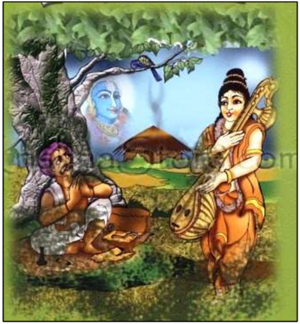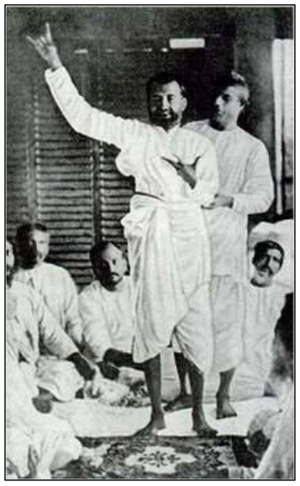Talk:Shānta Bhāva: Peaceful and Quiet Devotion with Faith in Him
By Vishal Agarwal
In this scenario, the bhakta does not establish any personal relationship with Bhagavān. He merely develops a one-pointed devotion toward Bhagavān with the knowledge of His superior nature. Numerous Vedic hymns reflect this bhāva, such as the:
Hiraṇyagarbha Sūkta – Ṛgveda 10.121.1–10
In the beginning, there existed God, the Source of all light. He was the One Bhagavān of created beings. He upholds this earth and the heavens. He, it is to Whom we offer our prayers. 1
He, who is the Giver of spiritual knowledge and the Giver of strength; Whom the world worships; Whose command all learned men obey; Whose shelter is immortality; Whose shadow is death. He, it is to Whom we offer our prayers. 2
He, Who by His greatness is the One Sole King of the animate and inanimate world; Who is the Creator and Bhagavān of all men and beasts. He, it is to Whom we offer our prayers. 3
Whose greatness these snowy mountains and the ocean with its waters proclaim; Whose arms are these vast regions. He, it is to Whom we offer our prayers. 4
By Whom the heavenly bodies are uplifted and the earth is made stable; by Whom the firmament and heaven are established; Who pervades the entire space by His spiritual essence. He, it is to Whom we offer our prayers. 5
To Whom the earth and the heavens look up, being upheld by His protection and moved by His will; in Whom the sun rises and shines forth. He, it is to Whom we shall offer our prayers. 6
When this vast matter producing an igneous condition and holding in its womb this universe, manifested itself, then He was the One Life of all shining beings. He, it is to Whom we offer our prayers. 7
He, Who in His greatness looked upon that diffused matter possessed of heat and energy, and producing this cosmos; Who is the One Supreme Bhagavān of bright things and learned men. He, it is to Whom we offer our prayers. 8
May the Bhagavān of Truth and Righteousness, Creator of the earth, Who has also created the heavens, and Who manifested the vast and shining matter; May He not inflict pain upon us. He, it is to Whom we offer our prayers. 9
O Bhagavān of all creatures! None other than Thee can control and govern all these created things. May the things, desiring which we pray to Thee, be ours by Thy grace. May we serve all good things in this world. 10
In the Upaniṣad-s too, several passages glorify the exalted nature of the Bhagavān as the Creator, Nourisher, Dissolver of the universe, as the revealer of the Veda-s, and so on. For example:
I fly for refuge, desiring my mokṣa, to that Deva, who at the beginning created Brahmā and gave the Veda-s to him and Who reveals the knowledge of Himself. Yajurveda, Śvetāśvatara Upaniṣad 6.8
A bhakta who practices this bhāva surrenders himself completely in the hands of Bhagavān. He has complete trust that whatever is happening to him is divine will and that Bhagavān, who desires his good and welfare, has a plan for him. He knows that eventually, Bhagavān will deliver him from all sorrows and pain. He dedicates his body, mind, and ātmā completely to Him. He has no craving for the fruit of his actions because he believes all situations are divinely orchestrated by his benevolent Lord.
Such bhakti makes the devotee peaceful, patient, and inwardly joyful. In Yogic scriptures, this attitude is termed Īśvara-praṇidhāna – surrendering one’s life and the consequences of all actions to Bhagavān.
Śrī Kṛṣṇa said:
Arjuna, the Bhagavān dwells within the region of the heart of all beings, causing them to revolve by Māyā, as if mounted on a machine. Gītā 18.61
Bhārata, seek refuge in Him alone with your whole being. By His grace, you shall obtain supreme peace and the eternal abode. Gītā 18.62
A modern scholar explains:
“Kṛṣṇa responds to each devotee according to his attitude. The attitude of the śānta-bhakta does not involve any kind of personal relationship with Kṛṣṇa. His attitude is entirely dominated by the aiśvarya (godly power and opulence) of Kṛṣṇa. Therefore, Kṛṣṇa appears to him as His partial manifestation, Nārāyaṇa in Vaikuṇṭha. He has no place in Vraja, where the devotees have some kind of personal relationship with Kṛṣṇa. The śānta-bhakta thinks that he belongs to Nārāyaṇa, not that Nārāyaṇa belongs to him...”
Examples of bhakta-s who demonstrated this bhāva include the ṛṣi-s Sanaka, Sanandana, Sanatkumāra, Sanātana, and Sanatsujāta. A prominent example is Bhiṣma in the Mahābhārata. Despite a painful end, he maintained equanimity and reverence to Śrī Kṛṣṇa, using his final days to impart sacred teachings on Dharma and mokṣa.
The religious works of nirguṇa bhakti sant-s and the Guru Granth Sāhib of the Sikhs are also important exemplars of śānta bhāva.
Story: The Leather Worker – A Śānta Bhakta of Bhagavān[edit]
A beautiful story is narrated about such a śānta-bhakta, contrasting him with another devotee who faltered due to lack of faith.
Once, Sage Nārada was on his way to Vaikuṇṭha, the abode of Bhagavān Viṣṇu, when he encountered two yogī-s meditating on Viṣṇu. One was a leather worker (cobbler) meditating under a tree; the other, a learned brāhmaṇa. Both asked Nārada to inquire how many more lives they would need to attain liberation.
On his return, Nārada told the cobbler, “Bhagavān Viṣṇu said you will be reborn as many times as there are leaves on the tree you sit under.” The cobbler replied joyfully, “Blessed I am! There is a limit now. I will meditate with even greater devotion knowing that Viṣṇu is pleased.”
Instantly, Bhagavān Viṣṇu appeared and said, “My child! You will attain mokṣa here and now, for you desire nothing but My pleasure. You are free from selfishness and full of surrender.”
The learned brāhmaṇa, upon hearing he needed a few more births, was disheartened. He lost faith and gave up his practice—his devotion was conditional and fruit-oriented, and hence he strayed from the path.
Story: Swami Ramakrishna Paramahaṁsa Bears His Cancer as Divine Will[edit]
Svāmī Rāmakṛṣṇa Paramahaṁsa (1836–1886 CE) inspired countless devotees to pursue spiritual life. In his later years, he developed throat cancer. His disciples pleaded with him to pray to Mā Kāli for a cure. Though he initially refused to ask for anything for himself, he finally agreed.
The next day, he said, “Yes, I prayed. But Mā Kāli replied: ‘Why do you ask me for such a trivial thing? Your body will perish one day anyway. Ask for something more precious.’ I felt ashamed and instead asked only to remain forever at Her feet, devoted to Her.”
His disciples wept in reverence, realizing they were in the presence of a saint who valued bhakti over his own life—a perfect śānta-bhakta surrendered to the divine will.



